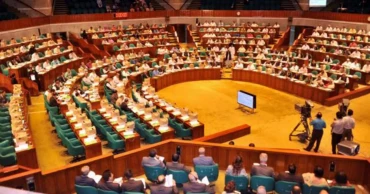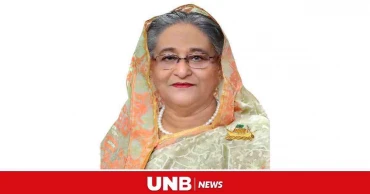Sheikh Mujibur Rahman
Protesters demolish Sheikh Mujib's murals in Bhola
Three murals of Sheikh Mujibur Rahman and Bhola district unit office of Awami League have been demolished by protesters, locals said on Friday.
The vandalism in Bhola erupted at 8 pm on Thursday and continued until midnight, they said.
The angry mob in Bhola used an excavator to destroy the remaining pieces of a broken mural of Sheikh Mujib in front of the municipal building.
Later, two more murals of him in front of Zila Parishad and Deputy Commissioner’s office were also demolished.
Student protesters demolish Sheikh Mujib's mural at JU
Around 10:45pm, the two-story Awami League office near Bangla School Square in the district headquarters was also torn down.
Witnesses said the protesting students and others bulldozed the structure. No member from the law enforcement agencies was seen at the scene.
Earlier on Wednesday night, the protesters attacked the residence of Awami League Advisory Council member and former Minister Tofail Ahmed on Gazipur Road in Bhola. They also vandalised the property and set it on fire.
1 year ago
13 universities renamed, dropping names of Sheikh Mujibur Rahman and Sheikh Hasina
The names of 13 universities across Bangladesh have been changed to reflect their respective districts, removing references to Sheikh Mujibur Rahman, Sheikh Hasina, and other family members.
The announcement was made by Local Government and Rural Development (LGRD) Adviser Asif Mahmud Shojib Bhuiyan on Thursday through a post on his verified Facebook account.
Ex-justice Rais Uddin made Administrative Appeals Tribunal chairman
The renamed universities are:
1. Sheikh Hasina University, Netrakona to Netrakona University
2. Bangabandhu Sheikh Mujibur Rahman University, Kishoreganj to Kishoreganj University
3. Bangabandhu Sheikh Mujibur Rahman University, Naogaon to Naogaon University
4. Mujibnagar University, Meherpur to Meherpur University
5. Bangabandhu Sheikh Mujibur Rahman Agricultural University to Gazipur Agriculture University
6. Bangabandhu Sheikh Mujib Shariatpur Agriculture University to Shariatpur Agriculture University
7. Bangabandhu Sheikh Mujibur Rahman Digital University, Bangladesh to Bangladesh Digital University
8. Bangamata Sheikh Fazilatunnesa Mujib Science & Technology University to Jamalpur Science & Technology University
9. Bangabandhu Sheikh Mujibur Rahman Science and Technology University, Pirojpur to Pirojpur Science and Technology University
10. Father of the Nation Bangabandhu Sheikh Mujibur Rahman Science and Technology University, Narayanganj to Narayanganj Science and Technology University
11. Bangabandhu Sheikh Mujibur Rahman Science & Technology University, Gopalganj to Gopalganj Science & Technology University
12. Bangabandhu Sheikh Mujibur Rahman Maritime University, Chattogram to Maritime University Bangladesh
13. Bangabandhu Sheikh Mujibur Rahman Aviation and Aerospace University to Aviation and Aerospace University Bangladesh
Govt condemns attack on ethnic minority students in Dhaka
1 year ago
7 best books on Bangabandhu Sheikh Mujibur Rahman
If anyone wants to know about Bangladesh, he or she must know about the Father of the Nation. Bangabandhu Sheikh Mujibur Rahman is an inseparable part of the nation’s history. Books can help to explore his remarkable life, from his early years to his charismatic leadership during tumultuous times. Autobiographies and other insightful books can vividly depict his struggles, political endeavours, and dedication to social justice. In this article, we have selected 7 best books on the Father of the Nation to help the youths learn more about the greatest leader in Bangladesh’s history.
Books by Bangabandhu
The architect of independent Bangladesh, Bangabandhu Sheikh Mujibur Rahman, the greatest Bangalee of all time, was not only a public leader but also deeply passionate about literature and culture. The proof of this can be found in his three books, ‘The Unfinished Memoirs’, ‘Prison Diaries’ and ‘New China 1952’.
The Unfinished Memoirs
‘Oshomapto Attojiboni’ (The Unfinished Memoirs) is an autobiography by the Father of the Nation, Bangabandhu Sheikh Mujibur Rahman written in Bengali.
In 2004, Bangabandhu’s daughter, Sheikh Hasina received four notebooks containing his writing. The writing on the old, worn-out pages revealed that these were his unfinished autobiography, written between 1967 and 1969 while in prison.
In his memoirs, Bangabandhu vividly paints a detailed picture of various facets of his life. He expressively recounts his ancestry and childhood years, his experiences during school and college, as well as his involvement in social and political spheres.
his story digs into the historical events that he closely observed as a committed political activist, both preceding and following India's partition. He provides insights into the occurrences such as famine, communal riots in Kolkata and Bihar, the partition itself, and the discriminatory stance of Pakistan's central government.
The memoir also meticulously documents pivotal moments such as the Language Movement, the emerging stirrings of the autonomy and independence movements, and skillfully captures a blend of immense uncertainties and soaring aspirations that defined the nation during that era.
Bangabandhu did not shy away from expressing his perspectives on other notable leaders of the time, such as Maulana Bhashani, A.K. Fazlul Haq, Mahatma Gandhi, Muhammad Ali Jinnah, Yar Mohammad Khan, Liaquat Ali Khan, Huseyn Shaheed Suhrawardy, Ghulam Muhammad, Abul Hashim, Khawaja Nazimuddin, Chaudhury Muhammad Ali, Mohammad Ali Bogra, and Nurul Amin.
This is the most reliable book to learn about the overall life of the Father of the Nation before the Liberation War. The book was first published in 2012 by The University Press Limited, Dhaka in Bangla language. Since its first publication, ‘The Unfinished Memoirs’ has been published in many languages including in braille as well.
Read more: Who was Sheikh Mujibur Rahman? A Short Biography of Bangabandhu, Father of the Nation
The Prison Diaries
‘Karagarer Roznamcha’ (The Prison Diaries) is the second memoir by Bangabandhu. Written in Bangla, this book is based on Bangabandhu’s days in jail from 1966 to 1968.
Besides discussing the details of prison life, the book reveals the political, economic, and social conditions of contemporary Pakistan. Bangabandhu mentioned political situations at that time, the condition of Awami League leaders and workers in prison, the condition of the media, and the ruthless torture of the rulers.
In addition to that, the Father of the Nation also highlighted conspiracy, betrayal, love of nature, devotion to parents, the joys and sorrows in prison in the book.
When Bangabandhu was released from prison in 1969, the then government of Pakistan seized his diaries. Four of them were returned later. In 2009, at the initiative of Prime Minister Sheikh Hasina and with the help of the Special Branch, two more notebooks were retrieved. Based on them, Bangla Academy published the book in 2017.
2 years ago
PM Hasina credits peaceful democratic atmosphere for country's massive progress
Prime Minister Sheikh Hasina on Sunday (May 28, 2023) said Bangladesh has been able to achieve remarkable socioeconomic development in the last 14 years due to a peaceful democratic environment prevailing in the country since 2008 elections.
She gave the credit for the success to her party Awami League which formed the government in 2009 after winning the 2008 election.
The prime minister was speaking at a programme celebrating the golden jubilee of the conferment of the Joliot-Curie Peace Medal to Father of the Nation Bangabandhu Sheikh Mujibur Rahman.
Cabinet Division organised the programme at Bangabandhu International Conference Center (BICC) with the PM in the chair.
Read more: US visa policy will apply to BNP leaders who are making open declaration to obstruct upcoming polls
Hasina said after getting the people's mandate in 2008 her government has been working for the development of the country in a planned way.
“As a result we have been able to reduce the poverty rate and maternal mortality, increase literacy and life expectancy,” she said.
“So a peaceful sustainable environment is needed for the people to attain economic emancipation, and all have to remember that,” she said.
Denouncing global arms race she put emphasis on settling all disputes through dialogue as Bangladesh did with India and Myanmar.
“Why this arms race (going on) now, why will not the money that is being used for arms competition be used for hungry children and humans. For this arms competition thousands of children and women are leading inhuman lives around the globe,” she said.
Read more: Bangladesh's upcoming national polls will be under AL govt: PM Hasina
In this connection, she mentioned that Bangladesh has given shelter to more than one million forcibly displaced Myanmar nationals, Rohingyas, who faced oppression her 1971. In this regard she recalled the genocide Bengalis suffered in 1971.
“We want that peace returns to the world. There shall be no types of unrest (in the world),” she said.
PM Hasina said that those who did not want the Independence of the country had killed Father of the Nation Bangabandhu Sheikh Mujibur Rahman.
“Every moment we have to overcome their (anti-Liberation forces) barriers,” she said.
The prime minister firmly said Bangladesh does not want any unrest and confrontation in the world.
Read more: How Bangladesh became a role model for dev: PM Hasina tells Qatar University students in Doha
“We want development in people’s lives, and we always want that for every one” she said.
She also announced introduction of ‘Bangabandhu Sheikh Mujib Peace Prize’ to recognise those who are working for establishing peace at home and abroad.
“Because we want peace we will surely advance towards the path of peace,” she said.
Eminent researcher Monayem Sarker delivered his keynote speech at the programme.
Eminent novelist Anwara Syed Haq, former Dhaka University Vice-Chancellor Dr AAMS Arefin Siddique, former principal secretary and chief coordinator of the Father of the Nation Bangabandhu Sheikh Mujibur Rahman Birth Centenary Celebration National Implementation Committee Kamal Abdul Naser Chowdhury took part in discussion on the keynote.
Read more: Mirza Fakhrul, Rajshahi BNP leader sued for 'death threat against PM'
President of Bangladesh Peace Council Mozaffar Hossain Paltu and Cabinet Secretary Md Mahbub Hossain also spoke.
The PM also released a first day cover and commemorative stamp and unveiled a souvenir publication on this occasion.
A documentary on Bangabandhu Sheikh Mujibur Rahman‘s JulioCurie Peace Prize award was screened at the programme.
Later, the prime minister witnessed a colourful cultural programme organised by Bangladesh Shilpakala Academy.
Bangabandhu Sheikh Mujibur Rahman, the founder of the Bengali nation-state and the architect of independence, the forerunner of democracy and peace movement, was awarded the JulioCurie Peace Prize by the World Peace Council on May 23, 1973.
Read more: PM’s 2nd visit to Qatar in 3 months bears sign of Bangladesh's visible presence in int’l arena: Momen
To commemorate the contributions of world-renowned scientists Marie Curie and Pierre Curie to the struggle for world peace, the World Peace Council introduced Joliot-Curie Peace Prize for distinguished individuals and organisations in 1950 for outstanding contribution to the fight against fascism, anti-imperialism, humanitarian welfare and peace.
Among the award winners were World leaders like Fidel Castro, Ho Chi Minh, Yasser Arafat, Salvador Allende, Nelson Mandela, Indira Gandhi, Mother Teresa, poet and politician Pablo Neruda, Jawaharlal Nehru, Martin Luther King and Leonid Brezhnev.
2 years ago
How was Bangabandhu’s birthday celebrated on March 17, 1975?
How was Bangabandhu’s birthday celebrated on March 17, 1975, before he was brutally assassinated 5 months later?
A video posted on Prime Minister’s ICT Adviser Sajeeb Wazed Joy’s verified Facebook profile shows how the country celebrated the Father of the Nation’s birthday that year.
Along with the video, Sajeeb Wazed posted a caption that reads: “March 17, 1975 was a memorable one as all ways led to Dhanmondi 32 where thousands of people gathered since the dawn to wish their leader on his birthday.
Read More: Bangabandhu’s birth anniversary and National Children’s Day celebrated in Canberra
“My grandfather Bangabandhu appeared before them, exchanging greetings and shaking hands. His day was tightly knitted with programs from appearing in an award-handing ceremony to receiving greetings from overseas diplomats. In addition, school students also greeted their leader inside the national parliament premises.
“Who knew that this man who kindled the spirit of freedom in the hearts of millions would be gunned down by the assassins the same year? The successive military rulers sealed the chapter in such a way that even the footages, recorded and stored by Bangladesh Film Archive, were not allowed to see the light.
“However, owing to the tireless works of those who preserved it, these footages are now made public.”
Read More: The Fearless Call commemorates fearless Bangabandhu
“On his birthday, I would like to pay my tribute to the father of the nation Bangabandhu Sheikh Mujibur Rahman,” Sajeeb Wazed wrote.
2 years ago
Bangabandhu Foundation pays tribute to Father of the Nation marking its 21st anniversary
The Bangabandhu Foundation has paid tribute to Father of the Nation Bangabandhu Sheikh Mujibur Rahman, marking its 21st anniversary.
Foreign Minister AK Abdul Momen, also president of the Bangabandhu Foundation, paid homage by placing a wreath at the portrait of Bangabandhu in front of the Bangabandhu Memorial Museum at Dhanmondi 32 in Dhaka on Wednesday.
Leaders and members of the foundation were also present at that time.
The foreign minister later celebrated the anniversary of the Bangabandhu Foundation by cutting a cake with the leaders and members.
Read more: Bangabandhu Foundation pays homage to ‘Father of Nation’ at Tungipara
3 years ago
The Triumphant Return of the Greatest Bengali
Bangabandhu Sheikh Mujibur Rahman returned to the conquered country 25 days after independence of Bangladesh - on January 10, 1972. There is no such homecoming in the history. Homecoming is not just a come back to 'sweet home,' a return to the country, the soil of the country, and the people after a lifelong struggle to finally return to the firm hope of building a dream-Sonar Bangla (Golden Bengal). Waiting for 28 days (9 months 12 days) to return home as a winner, while in the prison in Pakistan it was either death, or freedom. No, not death; Sheikh Mujib made the independence of his men and motherland after about 23 years of struggle, and a total of 13 years of imprisonment. He faced execution twice (1969 and 1971) but survived to implement the country's independence.
When the Bengalis was united for independence at the call of Bangabandhu, the Pakistani military launched a brutal attack on the night of March 25, 1971 on the independence-loving Bengalis and arrested Bangabandhu from his Dhanmondi residence on March 26 at 1.20 pm, shortly after he declared the independence of Bangladesh. He could have escaped if he wanted to. But Bangabandhu was not such a man. In an interview with British journalist David Fraser, he made it clear: 'I thought it is better I die and at least save my people who love me so much. I am their leader, I will embrace death if necessary, but why should I escape? 'However, after the victory of Bangladesh, on international pressure Bangabandhu was released from prison on the morning of January 8, 1972. After his release, he returned to the country on January 10, 1972, via London and Delhi. When the plane carrying Bangabandhu touched the runway of Tejgaon Airport that afternoon, countless crowds greeted their undisputed leader with cheers and sky-scraping 'Joy Bangla' slogans. Bangabandhu went to Suhrawardy Udyan (then Racecourse Maidan) straight from the airport, where he one day urged millions of Bengalis to jump into the freedom struggle. There, he congratulated the country's people in an emotional voice for snatching victory in the bloody liberation war and called upon all to dedicate themselves to rebuilding the war-torn country.
Read More: Bangabandhu’s Homecoming Day today
As soon as he returned to the country on January 10, 1972, getting him back alive millions of Bengalis welcomed him at the historic Suhrawardy Udyan, where once he called for independence ten months back. He firmly called upon people, "If my people are killed again, then my request to you is: 'build fortress in every home'. In his words, the desire to liberate the motherland has fascinated the whole nation, provoked, 'Remember, since we have given blood, we will give more, by we will surely liberate liberate the people of this country, inshallah.' He emphasized, 'The struggle this time is the struggle for our liberation. The struggle this time is the struggle for our independence.' After returning to the country, the father of the nation started tidying up the country. In the beginning, he gave his focus in formulating the state policies- the principles on which the new country Bangladesh would be governed. Mujibbad gave a remarkable imprint of the life, culture, and heritage of the land and people of the country in politics, gifted with his political experience, wisdom, foresight, and the uniqueness of independent Bengal.
He was not unaware of the plight of ordinary people in the war-torn country. He expressed his determination to alleviate their suffering as follows: "From today my request, from today my command, from today my order, as a brother-not as a leader, nor as to the president or as the prime minister, I am your brother, you are my brothers. This independence of mine will be futile-if the people of my Bengal are not fully fed on rice, this independence of mine will not be fulfilled-if the mothers and sisters of Bengal do not get clothes, this independence of mine will not be fulfilled-if the mothers and sisters of this country do not get clothes for the protection of their modesty, this independence of mine will not be fulfilled-if the people of this country, the youth of mine, do not find employment or do not get jobs."
Read More: Anne de Henning’s rare photos of Bangladesh’s birth, Bangabandhu to have Dhaka exhibit Dec 15-24
The drafting of the constitution reflected the idea of local, and not the imitation of other developed countries. The views of the people were reflected in the constitution; 98 recommendations were adopted on the basis of public opinion. Bangabandhu always emphasized the will and needs of the people first. In just nine months, Bangabandhu presented the nation with one of the world's best constitutions, which was adopted by the National Assembly on November 4, 1972, and came into effect from December 16 (Victory Day). Speaking on the constitution in the parliament, the country's architect said: "This constitution is written in the blood of the martyrs. This constitution will survive as a tangible symbol of the hopes and aspirations of the entire people."
It is unknown whether anyone else in history got a chance to speak about the passion and love that Bangabandhu expressed at the people's reception at all levels. Emotional Bangabandhu said at that auspicious time; my Bangladesh has become independent today. "My Bangladesh has been independent today, my life's desire has been fulfilled today, the people of my Bengal have been liberated today. My Bengal will remain free. Today I won't be able to make a speech. The way the sons of Bengal, the mothers of Bengal, the peasants of Bengal, the laborers of Bengal, the intellectuals of Bengal did struggle, I was imprisoned, was ready and waiting to go to the gallows. But I knew that they could not suppress my Bangalees. The people of my Bengal would be liberated."
Read More: ‘Intense, fragile, powerful’: Forbes effusively lauds Paris exhibit on Bangladesh’s birth, Bangabandhu
Sitting in a dark cell of a prison (multiple prisons - Karachi, Faisalabad) and dreaming of freedom, he was not sure he would return to his beloved motherland alive. "I did not know I would return to you", fascinated by the motherland, Bangabandhu uttered. "I have come. I did not know I was sentenced to death by hanging. A grave was dug for me beside my cell. I prepared myself, I said I'm a Bangalee, I'm a man, I'm a Muslim-who dies once not twice. I said, if death comes to me, I'll die laughing."
Although Bangabandhu was imprisoned in Pakistan from March 26, 1971 to January 8, 1972 (9 months and 12 days), obviously he was alive in Bangladesh's consciousness and liberation struggle, and inspired them for nine months. He was the President of the Mujibnagar Government and the first President of the country. In his physical absence or absence, the four national leaders conducted the Mujibnagar government i.e., the war of liberation, by embracing his ideals, thoughts, and consciousness.
Although he was in prison in Pakistan, he was not unaware of the atrocities that the Pakistanis had inflicted on the Bengalis in the nine-month war. Mentioning that 3 million people have been killed in the war, Bangabandhu aggrieved, "In the Second World War and also in the First World War, such a number of people, such a number of common citizens did not die, were not martyred, which happened in my 7-crore people's Bangladesh." While in prison in Pakistan, he was never disturbed or intimidated by the thought of execution. His compassion for the country was expressed in his speech: "I told just one thing, I have no objection if you kill me. Please return my dead body to my Bangalees, this is my only request to you."
He was a prison, but he believed that no one could keep the Bengalis in suppress. Bangladesh would be independent. And so he prepared in his mind about what to build an independent country. That is why he did not have to hurry or take time to concentrate on the task of building a Sonar Bangla, including the drafting of the constitution in the earliest possible time.
The ruthless Pakistani military could not kill this great humane-the leader of the seven-crore Bangali. But he had to give his life in the hands of his 'loved' ones, in the plan of the very own traitors, while the chief mastermind Mushtaq sent the cooked the sand duck to Bangabandhu's home just two days ago (13 August). Who knew that this 'lovely' feast was also an exercise in plotting to assassinate Bangabandhu! By killing Bangabandhu, the murderous circle silenced his dream of Sonar Bangla. The Bangladeshi forms of politics that he has formulated in this country taken from the soil and people's lives was also blocked. When the people of Bangladesh, under the leadership of Bangabandhu, were determined to transform the country into Sonar Bangla in a democratic state system with a secular mindset of the 1970s, they stopped that progress by killing him and went back to the 'religion'-centric social divisions like the 1940s.
Read More: What Was Bangabandhu Sheikh Mujibur Rahman's Childhood Like?
But the killers did not know that Bangabandhu could be killed and could not be kept suppressed (dabay rakha). He was, is, and will, always be. That is why the people overthrew the then military government in the late 1990s, overcoming all obstacles and bearing his secular mentality. He has always been equally popular, no matter whether his party is in power or not. For example, in a 2004 BBC poll, Bangabandhu was elected the greatest Bengali of all time (then the BNP-led government in power (2001-2006)). In 2005, the High Court quashed the Fifth Amendment to the Constitution and ruled to restore the 1972 constitution, which was upheld by the Supreme Court in 2010. Meanwhile, since 2010, people have rallied in various places, including the capital, to restore the 1972 constitution. In this favorable environment, the government led by his daughter restored the main provisions of the 1972 constitution in 2011. In addition to any emergency of the Awami League, Bangabandhu is still more relevant and influential in any crisis of the nation. As long as Bangladesh, so long Bangabandhu. In fact, Bangladesh and Bangabandhu are synonymous.
On the question of Bangabandhu's relevance, Bengali economist and Nobel laureate Amartya Sen recently stated that 'Bangabandhu and his ideals are still relevant'. He further emphasized that Bangabandhu's philosophy and ideology should be imitated in the conflicting contemporary world, especially in South and South-East Asia. Bangabandhu's need for secularism and religious freedom in resolving ethnic and religious conflicts not only in Asia but also in the Western world is undeniable and socialist democracy is essential to build an exploitation-free society. The country lost its genuine architect and friend- Bangabandhu Sheikh Mujib a quarter century ago. But he was, is, will be in the arteries of Bengalis: "As long as Padma, Meghna, Gouri, Jamuna flows on, Sheikh Mujibur Rahman, your accomplishment will also live on."
Read More: Ideals of Bangabandhu Sheikh Mujib Can Inspire the Young Generation
Dr. Ala Uddin, Professor, Department of Anthropology, University of Chittagong. Email: [email protected]
3 years ago
Bangabandhu’s Homecoming Day today
Today (January 10) marks the historic Homecoming Day of Father of the Nation Bangabandhu Sheikh Mujibur Rahman, the greatest Bangalee of all time. The day is being observed across the country in a fitting manner.
President M Abdul Hamid and Prime Minister Sheikh Hasina have issued separate messages on the eve of the day, paying tributes to the Father of the Nation.
Prime Minister Sheikh Hasina paid homage to the Father of the Nation by placing wreaths at his portrait in front of Bangabandhu Memorial Museum at Dhaka‘s Dhanmondi-32.
After laying the wreaths, the Prime Minister stood in solemn silence for some time as a mark of profound respect to the memory of Bangabandhu, the architect of independent Bangladesh.
Read: Homecoming Day of Bangabandhu: PM pays tribute at Dhanmondi-32
Awami League (AL) has planned various programmes to observe the historic day.
AL’s programmes began with the hoisting of the national and party flags at the party’s central office, Bangabandhu Bhaban and its party offices across the country at 6:30am.
AL leaders and workers paid homage to Bangabandhu by placing wreaths at his portrait in front of Bangabandhu Bhaban in the city’s Dhanmondi area at 7:30am.
At 11 am, an AL delegation will pay respect to the undisputed leader of the nation by placing wreaths at his grave in Tungipara.
Read: Bangabandhu’s ‘Homecoming Day’ to be observed Tuesday
The AL delegation will include its presidium members Lt Col Muhammad Faruk Khan, central committee members Awowar Hossain, Shabuddin Farazi Iqbal Hossain Apu, Marufa Alter Popy, and Gloria Sarkar Jharna.
On the occasion, a discussion will be held on a limited scale at the party's central office in Dhaka’s Bangabandhu Avenue at 3:30 pm, maintaining the health safety guidelines while Prime Minister and Awami League President Sheikh Hasina will preside over the event.
Besides, all district, city, upazila, thana, union and ward level units of the AL, its associate bodies are organising similar programmes to observe the day in a befitting manner.
In a statement, AL General Secretary and Road Transport and Bridges Minister Obaidul Quader urged all party leaders, workers and its associates to observe all the programmes, marking Bangabandhu's Homecoming Day in a fitting manner.
Read More: Anne de Henning’s rare photos of Bangladesh’s birth, Bangabandhu to have Dhaka exhibit Dec 15-24
Bangabandhu, the undisputed leader of the nation and supreme commander of the country's Liberation War, returned to the newly independent Bangladesh after over nine and half months of captivity in a Pakistan jail on January 10 in 1972.
3 years ago
21st Parliament session to continue till Feb 9
The 21st session of the current parliament that began Thursday will continue till February 9.
The session will start at 4:15pm on each working day.
On January 10, a special discussion will be held on the Homecoming Day of the Father of the Nation Bangabandhu Sheikh Mujibur Rahman.
The decisions came at a meeting of the Business Advisory Committee (BAC) of the current parliament held at Jatiya Sangsad Bhaban in Dhaka.
Read more: Parliament back in session; to continue till July 4
Committee Chair and Speaker Dr Shirin Sharmin Chaudhury presided over the meeting.
It also decided to hold a special session in April to observe the Golden Jubilee of Bangladesh Jatiya Sangsad. President Abdul Hamid will address the session and general discussion will be held on Thanksgiving motion of his speech.
It also decided that the Speaker may extend or cut the working days of the current session.
Prime Minister Sheikh Hasina, Opposition Leader Raushon Ershad, Amir Hossain Amu, Sheikh Fazlul Karim Selim, Obaidul Quader, Rashed Khan Menon, Hasanul Huq Inu, Deputy Speaker M Shamshul Huq Tuku, Anisul Huq, Golam Mohammad Quader, Anisul Islam Mahmud and Noor-E-Alam Chowdhury attended it.
Read more: 19th JS session to continue till September 1
3 years ago
PM Hasina’s 76th birthday Wednesday
The 76th birthday of Prime Minister Sheikh Hasina, who is also the president of ruling Awami League, will be celebrated on Wednesday.
Sheikh Hasina, the eldest among the five children of Father of the Nation Bangabandhu Sheikh Mujibur Rahman and Bangamata Sheikh Fazilatunnesa Mujib, was born at Tungipara in Gopalganj on September 28 in 1947.
The premier is now in the USA where she addressed the 77th session of the United Nations General Assembly (UNGA) besides attending a host of other events.
AL and its affiliated and likeminded organisations will celebrate the day through various programmes focusing on her life and achievements.
The birthday celebration will be marked by discussions, doa and milad-mahfil and special prayers in the capital and elsewhere in the country.
Sheikh Hasina assumed office on 7 January, 2019, for the fourth time after her party-led grand alliance won the 11th parliamentary election held on December 30, 2018.
She served as Prime Minister for the first time in 1996-2001, second term in 2009-2013, and the third term in 2014-2018. Hasina served as the Leader of Opposition thrice.
Read: PM Hasina’s 75th birthday to be celebrated Tuesday
Hasina spent much of her childhood in her birthplace Tungipara in Gopalganj district. When Bangabandhu was elected a legislator, his family moved to Dhaka in 1954. She graduated from the University of Dhaka in 1973.
Having a chequered political career, Hasina was elected vice-president of the Students Union of the Government Intermediate Girls College when she contested as a candidate from the Students League.
Later, she served as secretary and then as president of the college unit of the Student League. She was also a member of the Students League at Dhaka University and became the secretary of the Rokeya Hall unit. She actively participated in all mass movements from her student life.
Bangabandhu, along with the members of his family, was brutally assassinated on the fateful night of August 15, 1975. Hasina and her younger sister Sheikh Rehana survived the carnage as they were in Germany at that time.
Hasina was unanimously elected as the president of Bangladesh Awami League in 1981 in her absence while she was in forced exile. She finally returned home on May 17, 1981, ending her six years in exile.
She faced the wrath of the then rulers on her return as she launched a movement to restore democracy in the country. Hasina was detained time and again, and at least 22 attempts were made on her life.
3 years ago



















